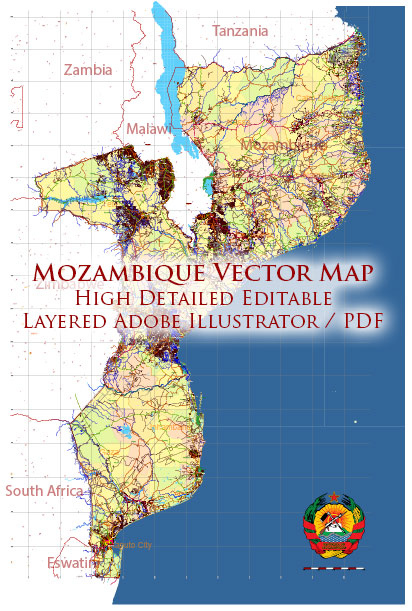Mozambique Vector Road and Street Maps in Adobe Illustrator, PDF, and other vector formats
For publishing, design, printing, media, publications, arts, projects, presentations, for architects, designers, and builders, business, logistics.
Mozambique is a country located on the southeastern coast of Africa, known for its diverse culture, natural beauty, and rich history. Here’s a brief overview:
Capital and Major Cities:
- Capital: Maputo
- Other Major Cities: Beira, Nampula, Quelimane, Pemba
Population:
- Mozambique has a population of over 30 million people, making it one of the most populous countries in Southeast Africa.
Languages:
- Portuguese is the official language, reflecting Mozambique’s colonial history. However, numerous Bantu languages are spoken across the country, and Swahili is also commonly used.
Ethnic Groups:
- Mozambique is home to a diverse range of ethnic groups, including the Makhuwa, Tsonga, Yao, and Makonde, among others. The population is culturally rich and reflects a blend of African, Arab, and European influences.
Geography:
- Mozambique features a varied landscape, including long stretches of coastline along the Indian Ocean, fertile plains, and mountainous regions. The Zambezi River, one of Africa’s major rivers, flows through the country.
Natural Resources:
- Mozambique is endowed with natural resources, including minerals like coal and natural gas. The country also has significant agricultural potential, with crops such as cashews, cotton, and citrus fruits.
History:
- Mozambique gained independence from Portuguese colonial rule in 1975. Following independence, the country went through a period of civil war, which lasted until 1992. Since then, Mozambique has made strides in economic development and political stability.
Politics:
- Mozambique operates as a multi-party democracy. The Mozambique Liberation Front (FRELIMO) has been the dominant political party since independence. The country has experienced periods of political stability, as well as challenges related to governance and corruption.
Economy:
- The economy of Mozambique is diverse, with agriculture, industry, and services sectors. The discovery of natural gas reserves has attracted significant investment in recent years.
- Agriculture plays a crucial role, employing a large portion of the population. Cashews, sugar, and tobacco are among the key agricultural exports.
Culture:
- Mozambique’s cultural heritage is rich and diverse, influenced by a mix of indigenous traditions, Portuguese colonial history, and interactions with Arab and Swahili traders.
- Traditional dance, music, and art are essential components of Mozambican culture. The country has a vibrant and evolving contemporary arts scene.
Tourism:
- Mozambique has a growing tourism sector, attracting visitors with its pristine beaches, coral reefs, and diverse marine life. Popular destinations include the Bazaruto Archipelago and the Quirimbas Archipelago.


 Author: Kirill Shrayber, Ph.D. FRGS
Author: Kirill Shrayber, Ph.D. FRGS